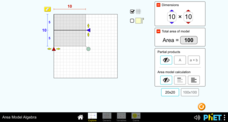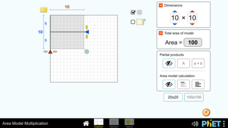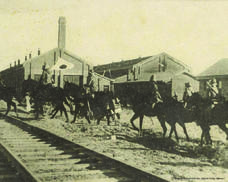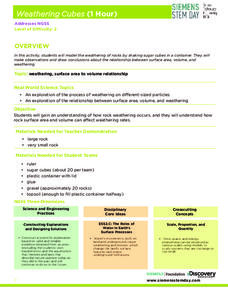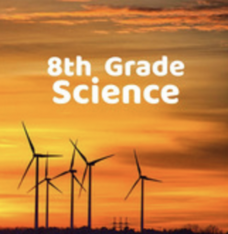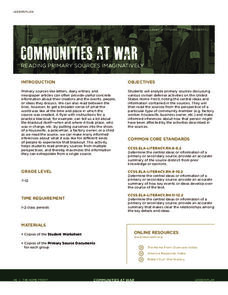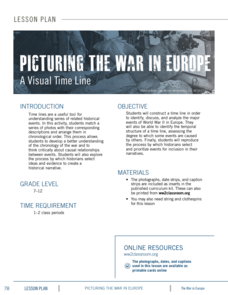National WWII Museum
Strategic Decision Making in the Pacific Scenarios
Individuals decide what they would do when faced with a difficult military decision that puts others' safety in jeopardy. The lesson also gives the real-life outcomes of the scenarios that occurred during World War II to give them a...
PHET
Area Model Algebra
Expand the pupils knowledge of using area models to algebra. The interactive allows learners to use the same procedure of getting partial products when multiplying multi-digit numbers to multiplying polynomials. Scholars see how the...
PHET
Area Model Multiplication
Develop a solid understanding of multiplication. The interactive provides opportunities for learners to continue building a deep understanding of multiplication. Pupils use the application to find the product of two numbers and find...
Discovery Education
Smoke on the Water
How do clouds form? Learners demonstrate the formation of clouds and the water cycle by testing four different setups in a plastic bottle. They identify the key components of a cloud to help them understand the process of cloud...
Discovery Education
School of Rock
Why do rocks break down over time? Learners explore this concept by simulating physical and chemical weathering of different types of rocks. They use an abrasive to demonstrate physical weathering and acid to demonstrate chemical...
Discovery Education
By All Indications
How do people determine if something is acidic or basic? Learners make their own acid-base indicators using red cabbage and then determine the acidity and alkalinity of different substances. First, they test substances of known pH and...
Discovery Education
How's the Weather?
Young meteorologists explore different aspects of the weather while learning about measurement devices. They build instruments and then set up a weather station outside and measure temperature, humidity, air pressure, wind speed, and...
Discovery Education
Motion in the Ocean
How do temperature changes affect ocean currents? Scholars explore convection currents by demonstrating the flow of water in a baking dish. They use ice, heat, and food coloring to see currents. Then, they draw conclusions about their...
Discovery Education
Solar System Scale
Extremely large or extremely small numbers are difficult to comprehend. To help understand the massive scale of the solar system, learners complete two activities. First, they create a model to compares the size of the bodies in the...
National WWII Museum
Picturing the War in the Pacific Photos, Datelines and Captions
Young historians have the opportunity to see photos from the war in the Pacific and learn more about what each photo represents. Scholars use their knowledge of WWII to match dates and descriptions to real-life photos from the war. The...
Larson Lab
Animal Classification
How are animals classified? Scholars explore animal classification by observing non-living and living specimens. They learn how to organize animals into vertebrates and invertebrates and identify the five vertebrate groups: mammals,...
Discovery Education
Weathering Cubes
Weathering is not necessarily a result of the weather. Scholars conduct an experiment to explore the effect of surface area and volume on the weathering process. They create their own sugar cube rocks using the same number of cubes—but...
Discovery Education
Blueprint for Life
DNA is the code for all biological traits, both plant and animal. Using an exploratory lesson, learners begin to explore the concept of a biological code by decoding word puzzles. They then extract DNA from plant cells using detergent to...
Utah Education Network (UEN)
Utah Open Textbook: 8th Grade Science
The cycle of energy is important to many different systems on Earth. Scholars use questioning and observation to investigate the differences between renewable and non-renewable resources and how they relate to global changes. They...
Utah Education Network (UEN)
Utah Open Textbook: 7th Grade Science
Physical and biological factors affect everyday living. Scholars explore electromagnetic forces, motion, the rock cycle, and geological changes. They examine cells as the building blocks of life and how organisms reproduce using images...
National WWII Museum
Communities at War: Reading Primary Sources Imaginatively
Uncle Sam wants you to support the troops. Learners use an engaging lesson plan to analyze primary and secondary sources to discover what life was really like for American citizens at home during WWII. Pupils complete worksheets, group...
PBS
Stereotypes vs. Statistics (Grades 4-8)
Stereotypes can be painful if they are used to discriminate against others. Statistics, however, can be helpful in dispelling myths propagated by stereotypes. Using a thoughtful lesson plan, scholars complete graphic organizers and...
Pixton Comics Inc.
Elements of an Epic
Mythic heroes, gods and goddesses, and epic tales come alive as young artists craft their own graphic novel or mind map for classic epics, including The Odyssey, Beowulf, Harry Potter, and Star Wars, identifying the six elements of every...
New York City Department of Education
Straw Rockets
Scholars become rocket scientists as they take off on a journey exploring Newton's laws of motion. After learning the laws of motion, pupils design their own investigations using straw rockets. They highlight their literacy skills in a...
iCivics
LawCraft
What's it like to be a senator or member of the House of Representatives? Using a video game simulation, learners discover what it is like to craft and pass legislation from its idea through conference committee. Pop ups and annotation...
Space Awareness
Model of a Black Hole
Even light cannot leave the force of a black hole! Learners use a model to explore the gravitational force of a black hole. An elastic bandage and heavy ball serve to create the hole, while marbles become the victims of its strong force.
National WWII Museum
Picturing the War in Europe: A Visual Time Line
Where does it fit in history? Learners consider the choices historians make when evaluating events by constructing a timeline of World War II. Using photographs of events in the conflict, they create a chronology. Once finished,...
Curriculum Development Institute
Impact of Cultural Revolution
What is the role of primary and secondary sources in the study of history? How reliable are these different sources? As part of a study of the Chinese Cultural Revolution, class members examine a variety of resources and evaluate their...
Evergreen Exhibitions
Leonardo da Vinci: Machines in Motion
Motion is the focus of ten hands-on activities that challenge scholars to build machines invented by Leonardo da Vinci. Following several steps, small groups work collaboratively to recreate machines including levers, pulleys, wheels,...



